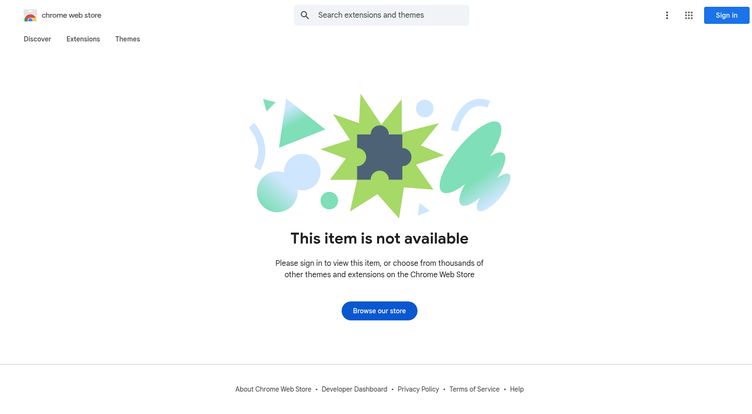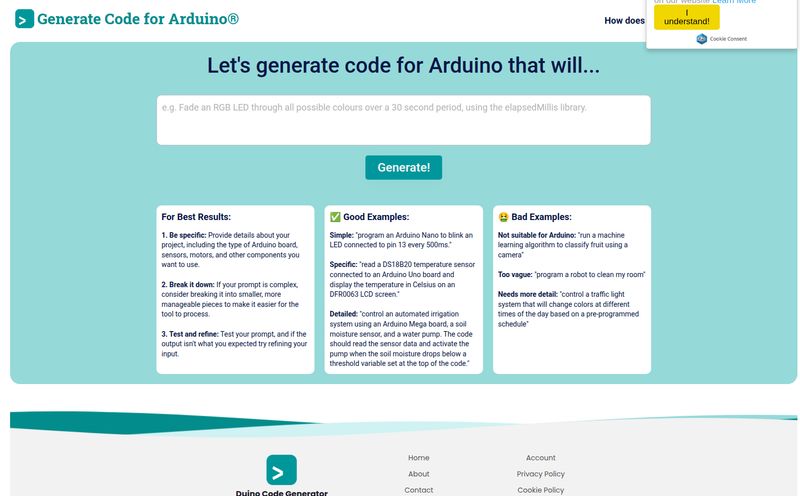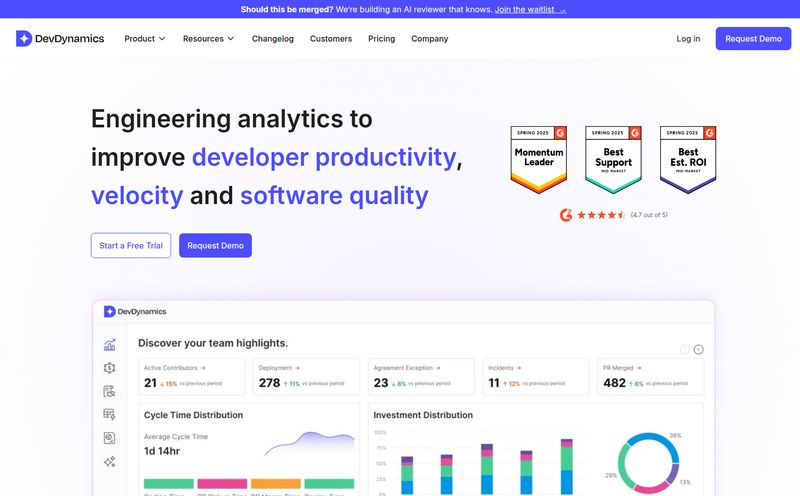You know that feeling when you stumble upon a niche little tool that seems tailor-made for you? That perfect little cog that fits right into your workflow, promising to save you hours of mind-numbing work. For me, as someone who lives and breathes SEO, data, and a bit of creative world-building on the side, that's the holy grail.
A while back, I heard whispers of a tool called Tabulator AI. The premise was simple, almost elegant: an AI-powered CSV generator that could spin up creative, detailed tables from a single text prompt. My mind immediately started racing. Think of the possibilities! Loot tables for a D&D campaign, character trait lists for a novel, procedurally generated item stats for an indie game, or even generating keyword variations for an SEO project. It sounded fantastic.
It was positioned as a creative's best friend—a quick-start engine for anyone involved in game development, storytelling, or just needing a jolt of inspiration. The idea of just typing “a list of steampunk-inspired potions with their bizarre side effects” and getting a ready-to-use CSV file... well, that's the kind of tech that gets me excited.
What Was Tabulator AI Supposed to Be?
At its core, Tabulator AI was an AI CSV generator. You give it a prompt, it gives you a table. Simple as that. This wasn't about crunching complex business analytics; it was about pure, unadulterated creative generation. It was for the dreamers, the builders, the storytellers. The tool was aimed squarely at people who needed structured data but didn't want to spend half their day manually populating spreadsheets.
For a game developer, it could be the difference between a generic world and a rich one. Instead of having five types of swords, you could generate a hundred, each with a unique name, origin story, and magical property. All in the time it takes to brew a cup of coffee. That's not just a time-saver; it’s a creativity multiplier.

Visit Tabulator AI
The Obvious Upsides of a Tool Like This
Let's talk about why the concept was so darn appealing. The biggest win is, without a doubt, speed. Anyone who’s ever built a world for a game or story knows the sheer amount of data you need. Faction names, city exports, NPC inventories, magical spell components... it's a mountain of work. A tool like Tabulator AI acts like a creative sledgehammer, breaking big tasks into manageable, instantly-generated chunks.
I’ve always felt that the initial blank page (or empty spreadsheet) is the hardest part. It’s where inspiration goes to die. This tool was a direct assault on that problem. It was designed to give you that messy, exciting, and inspirational first draft to work from. You might not use every single line it generates, but it gets the ball rolling. And sometimes, that's everything.
But Let's Be Real: The Potential Downsides
Of course, nothing is ever that perfect. With any AI tool, especially one based on generative models, the quality of the output is directly chained to the quality of the input. I’ve spent enough time wrestling with various AIs to know that “prompt engineering” is a real skill. I imagine Tabulator AI was no different.
You’d probably have to learn its specific quirks. How to phrase a request to get the columns you want, how to nudge it towards a certain tone, and how to avoid it spitting out nonsense. Some might see that as a flaw. Personally, I kind of enjoy the process—it feels like learning to communicate with some strange alien intelligence. The other sticking point was the lack of clarity around advanced customization. How much control did you really have over the final output? The details were always a bit fuzzy.
So, Where Can You Get It? The Chrome Store Mystery
Here’s where our story takes a left turn. Fired up by the idea, I went to find it on the Chrome Web Store, ready to put it through its paces. And I was greeted with this:
“This item is not available. Please sign in to view this item, or choose from thousands of other themes and extensions on the Chrome Web Store.”
Poof. Gone. A digital ghost.
This isn't actually that uncommon in the wild west of browser extensions and indie software. Projects get abandoned. Developers move on. Sometimes a tool gets acquired and absorbed into something bigger, or it violates a new policy and gets delisted. We dont really know what happened. It’s a stark reminder of the ephemeral nature of some of the cool digital tools we come to rely on. One day they're revolutionizing your workflow, the next they're a dead link and a 404 page.
Life After Tabulator AI: How to Generate Tables Now
So, Tabulator AI might be off the table (pun absolutely intended), but the dream isn't dead. If you're looking for that same creative spark for your projects, you still have options. In fact, the landscape is probably even better now.
Here are a few ways you can replicate that functionality:
- General Purpose AIs (ChatGPT, Claude, etc.): This is the most obvious route. These models are incredibly powerful and can easily generate tables. The key is in the prompt. You have to be very specific. For instance: “Generate a table in markdown format with 4 columns: ‘Potion Name’, ‘Ingredients’, ‘Effect’, and ‘Steampunk-sounding Side Effect’. Give me 10 rows.” You can then copy-paste this into a spreadsheet or use an online converter to get a CSV.
- Specialized Game Dev Tools: There are many generators built for specific systems. Donjon is a classic for fantasy RPGs, offering everything from dungeon maps to treasure lists. While not a single-prompt AI, it’s a treasure trove of procedural generation.
- Google Sheets with AI Add-ons: The game has changed right inside your spreadsheet. You can now get AI add-ons for Google Sheets that allow you to generate content directly in cells. It’s a bit more hands-on but incredibly powerful for building out data sets.
What Was the Price of Entry?
This was another little mystery surrounding Tabulator AI. There was no clear pricing information available. Was it a free tool with premium features? A one-time purchase? A subscription? We may never know. In the current AI gold rush, many tools are launching for free to build a user base, so it’s possible it was free, at least initially. But for now, its cost is as much a mystery as its disappearance.
Frequently Asked Questions
- What was Tabulator AI?
- Tabulator AI was an AI-powered tool designed to generate creative tables in CSV format from a single text prompt. It was aimed at creative professionals like game developers, writers, and world-builders.
- Why can't I find Tabulator AI on the Chrome Web Store?
- The extension is no longer listed on the Chrome Web Store. The exact reason is unknown, but it could be due to the project being discontinued by the developer, a policy change, or other factors.
- Was Tabulator AI free?
- There was no publicly available information on its pricing model, so it's unclear if it was free, a one-time purchase, or a subscription service.
- What are good alternatives to Tabulator AI?
- You can achieve similar results using large language models like ChatGPT or Claude by giving them specific prompts to generate tables in markdown format. You can also look into specialized generators like Donjon for RPGs or AI add-ons for Google Sheets and Excel.
- Do I need special skills to use AI for table generation?
- While you can get basic results easily, learning some simple “prompt engineering” will significantly improve your outputs. This involves being clear and specific in your requests, defining your desired format, and providing examples to the AI if necessary.
Final Thoughts on a Tool That Was
So, here we are. Tabulator AI seems to be a closed chapter. It's a bit of a shame; the concept was solid, and in a world saturated with AI writing assistants and image generators, a dedicated AI table generator felt refreshingly focused and genuinely useful. It’s a great example of a brilliant idea that, for whatever reason, didn't stick around.
But the story of Tabulator AI is a good reminder of two things. First, the pace of innovation in the AI space is just blistering. And second, for every tool that vanishes, ten more pop up to take its place. The spirit of Tabulator AI lives on, just in different forms. Now if you'll excuse me, I have a prompt to write about a list of cursed artifacts for a space pirate campaign.
Reference and Sources
- Donjon - A collection of random generators for fantasy role-playing games.
- Chrome Web Store - Official marketplace for Google Chrome extensions.



